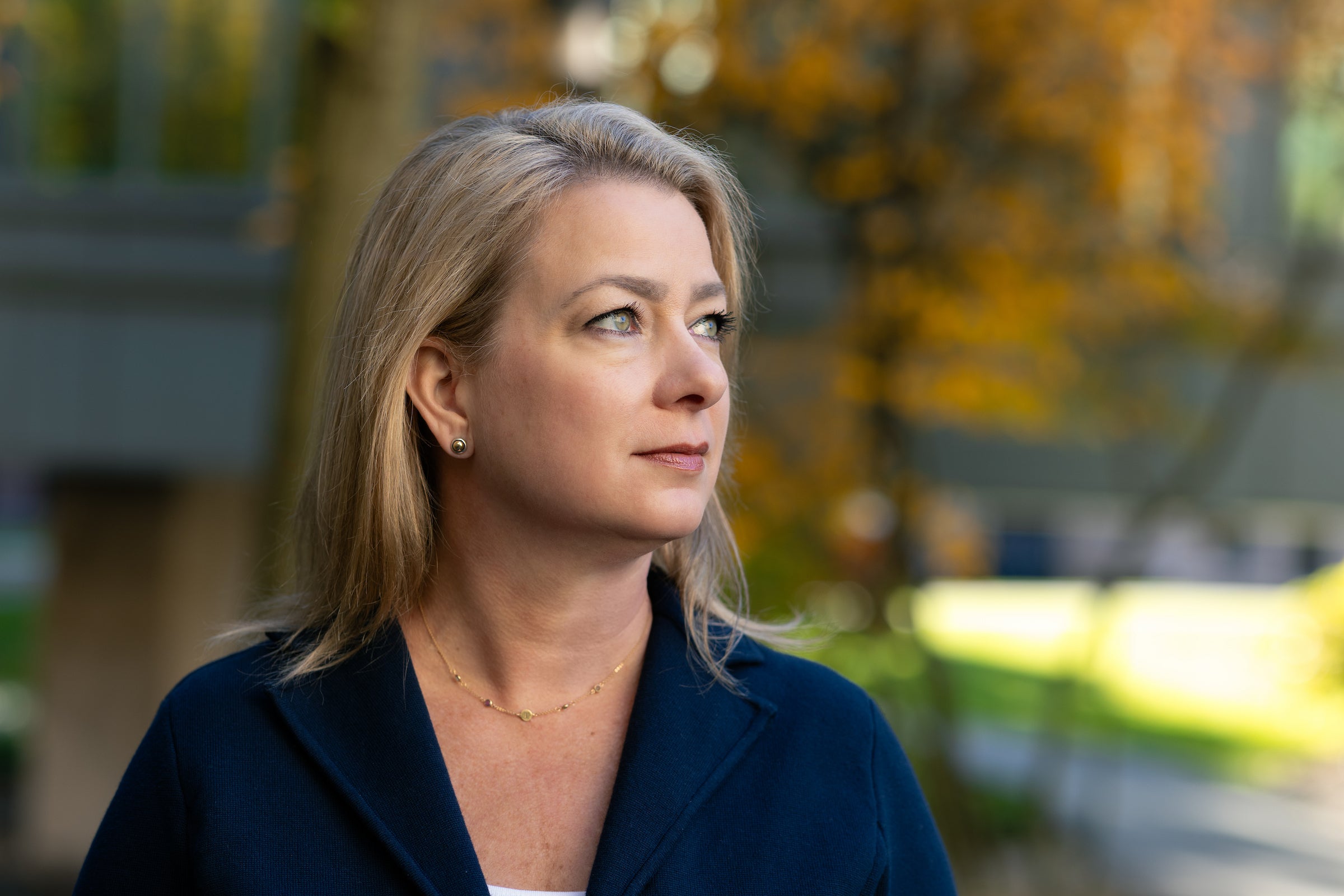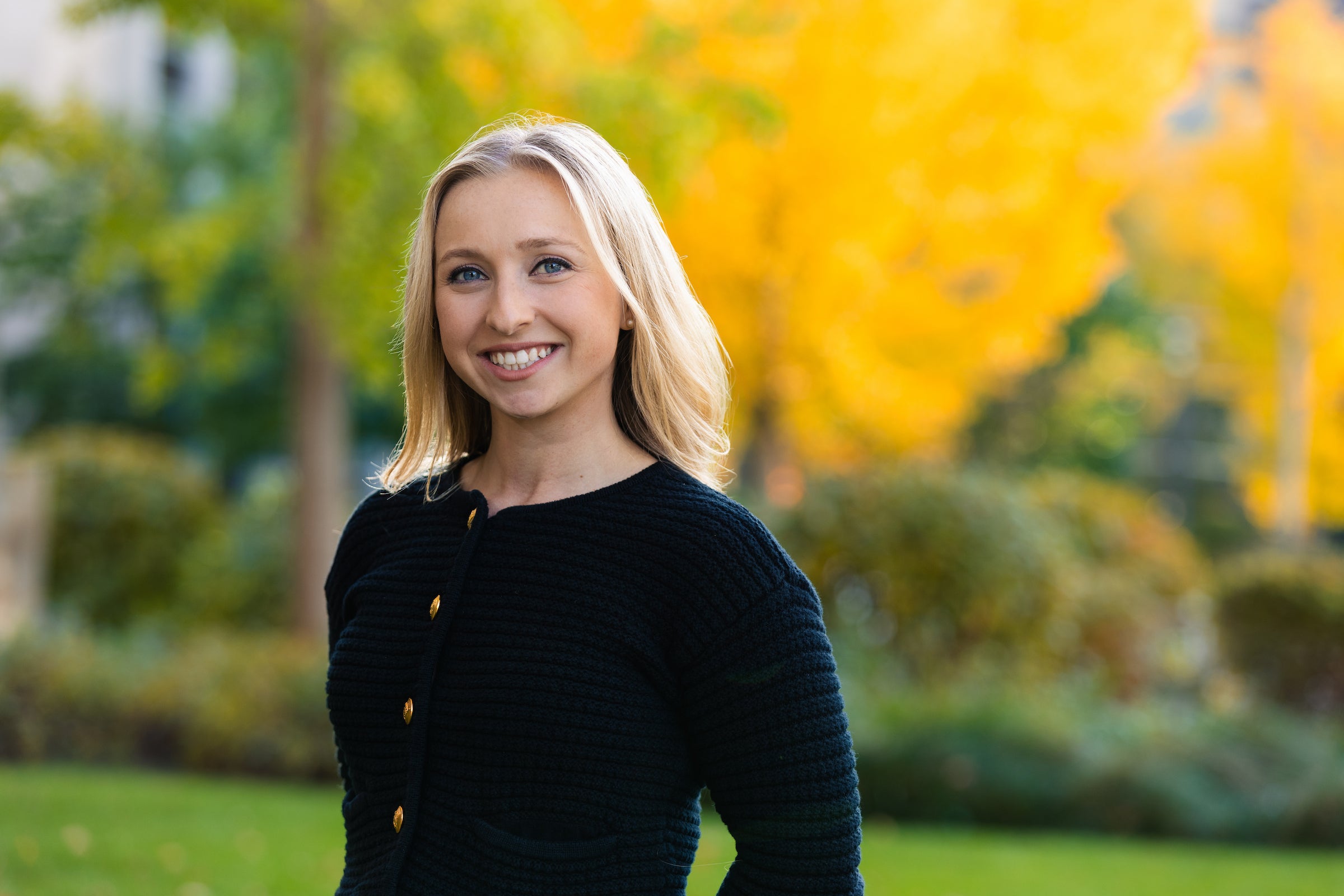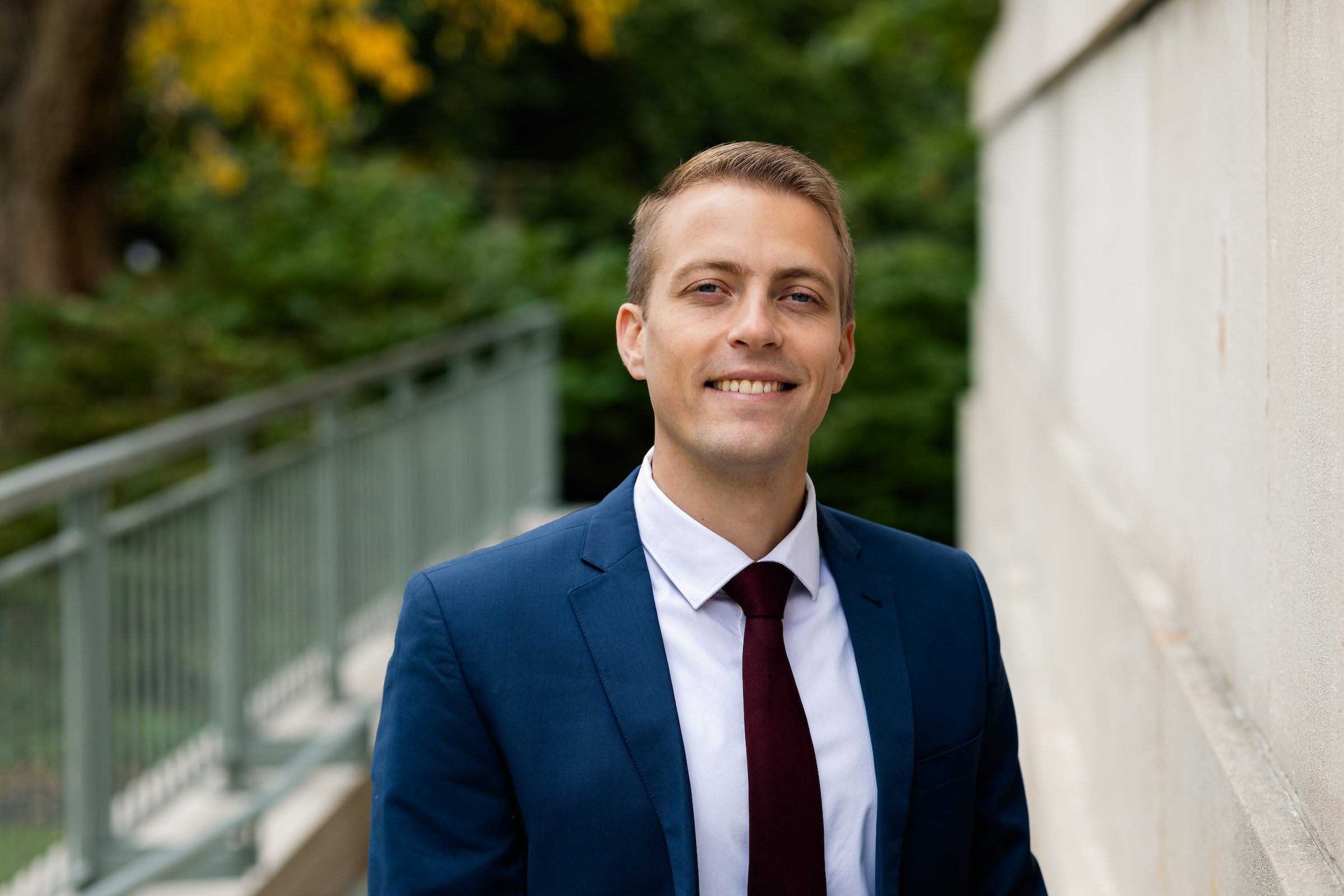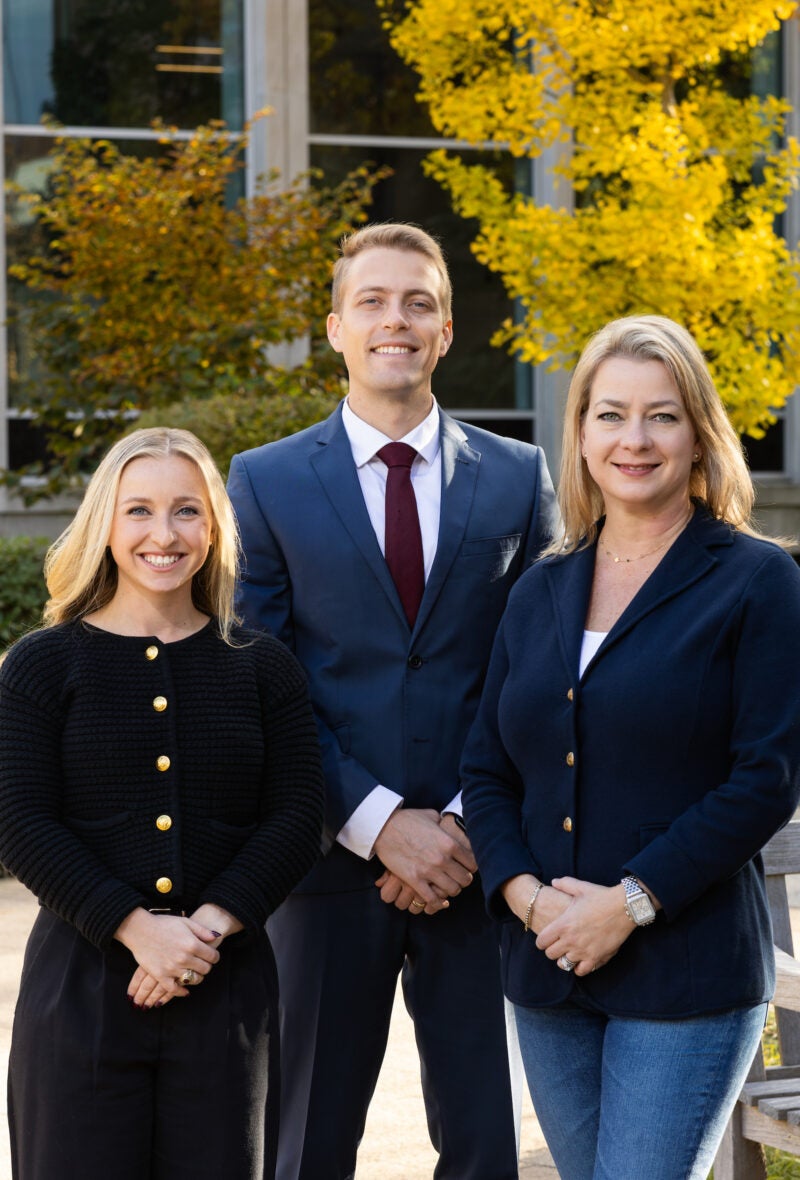As we honor our veterans and service members nationwide, Harvard Law Today shines a light on just a few of those who have served on the road to Harvard Law.
Theresa Champ LL.M. ’26

Theresa Champ LL.M. ’26 knows her life story — and her journey to becoming a leading Navy lawyer — is unconventional, to say the least.
For starters, how many other service members were blacklisted from the Eastern Bloc — as a child?
Today, Champ, most recently the top Judge Advocate General for the Navy’s Sixth Fleet, is celebrating 17 years of service and attending Harvard Law School’s Graduate Program. But growing up, a career in the armed forces seemed quite unlikely.
Champ is the youngest of five children born to counterculture Christian parents who, like many of their generation, maintained a distrust of the government shaped by the Vietnam War and the turmoil of midcentury America.
“I’m probably the last person you would expect to end up in the military,” Champ laughs.
By the time Champ was born, her family was living in Texas, traveling between the Lone Star State and Mexico, where they brought humanitarian aid to orphanages and homes for the elderly while sharing their religious faith.
When she was 5, Champ’s family moved to Eastern Europe, settling primarily in Budapest. There they continued their mission, hoping to convert communists to Christianity. Despite the challenges of life behind the Iron Curtain, these were some of Champ’s happiest years growing up. “Hungary is a beautiful country and there are a lot of great people there,” she says.
On one particularly memorable road trip, the family traveled in their camper van from Budapest into Moscow. “It was a surreal experience being in the Soviet Union in particular during that time, because we had to always be on guard,” she says.
Champ and her family arrived at the USSR border in the middle of the night, where the van was searched by soldiers hunting for contraband.
“They tore the motor home apart, but they didn’t find anything,” she says. “All the while, us kids had smuggled these religious tracts in our clothes and a special bodysuit my mom was wearing.”
Later, while living in Bulgaria, Champ’s mom met a group of young people who seemed friendly and interested in their message. They turned out to be KGB agents. “We ended up getting kicked out of the country and blacklisted from all the Soviet Bloc nations,” she recalls.
Feeling stifled, the family relocated once more, this time to South America, where they built schools and conducted outreach work. But Champ’s patience with that life was running thin, and at age 15, she told her parents she was done. She wanted to go back to the U.S. and become a lawyer.
“I didn’t know what that meant,” she says. “I had just gotten it in my head from watching the movie ‘Beaches.’”
Read Theresa Champ’s full story
Leah Foodman ’28

Leah Foodman, who grew up in Redding, Connecticut, thrives on setting significant challenges and surmounting them, from riding on ambulance calls as a certified EMT in high school to serving among the first women in ground combat roles to leaving the military life she loved to study at Harvard Law School.
Foodman knew nothing about the military until she visited the U.S. Military Academy at West Point as a high schooler. But thousands of volunteer hours as an EMT, starting at age 15, instilled the desire to serve. “I loved the people, the service aspect, the camaraderie, feeling like I was part of something, and being able to help in someone’s worst moment,” says Foodman, who still volunteers on ambulance calls during trips home.
She never expected that EMS would lead her to the military, but the second she stepped on the West Point post she felt the call. “I saw the discipline and felt the common sense of service and sacrifice, and I had this feeling that ‘If I can do this, I will be able to tackle anything life throws at me,’” she says. “I wanted to take on that challenge, I wanted to be part of something bigger than myself, and above all, I wanted to serve my country.”
It was “definitely hard,” she says. “On top of academic classes, you have military duties and physical education classes like boxing and survival swimming. In boxing, I remember thinking, ‘I’ve never been punched in the face before.’ But that’s the point. They tell you that you’re there to learn more than how to box or swim. You’re there to learn how to take a punch or a wave to the face and keep moving forward. In retrospect, I really appreciate the lessons learned. When I feel like I’m being metaphorically punched in the face, I remind myself what a physical punch feels like.”
After her first year at West Point, she attended the U.S. Army Airborne School in Fort Benning, Georgia, where she jumped from a plane five times and earned her jump wings.
“At 18 years old, that was a big moment of overcoming fear,” says Foodman. “I feel like the moments that made me the person I am and that I’m most proud of were not necessarily classroom feats like taking a test or writing a paper, but moments where I proved to myself that I could do something I never thought I could.” Foodman adopted the personal mantra, “Feel the fear and do it anyway.”
Read Leah Foodman’s full story
Kent Romney ’28

In the United States Air Force, a call sign — or nickname used over communications channels like radio — is bestowed upon a pilot or officer by their peers, often based on their personality or an inside joke.
During his half decade of military service, Kent Romney ’28 was graced with the call sign Vlad, a nod to his knowledge of the Russian and Ukrainian languages — and an acronym for “Very long atrocious diatribe.”
The diatribe at issue came during his military promotion ceremony — an involuntary one, he adds — in which he again swore an oath to defend the Constitution. Not only did Romney recite the vow verbatim, but he also held forth on what the nation’s founding document means to him.
“I’m romantic about this,” he says. “The speech was about how inspiring it is that we were all there to defend the Constitution of the United States, because it’s the Constitution that provides us the liberties and the rights and the privileges to be our best people.”
Despite its teasing humor, the call sign reflects a serious truth about Romney. His service as an intelligence officer in the Air Force, and later Space Force, was motivated by the same thing that has pushed him to pursue law as a first-year student at Harvard Law School: a sincere commitment to democratic values and freedom.
“The rule of law is sacred and worth defending, just as our rights and the Constitution are worth defending,” he says.
Romney grew up in Utah, the second of six children. Although he had no familial connections to the military, as a young boy, Romney found himself fascinated by American history, particularly World War II.
“I would watch eight-hour documentaries about the war like kids today watch Paw Patrol,” he laughs.
Inspired, the young Romney decided he would join the military someday. He says he didn’t realize what this would mean until years later, as an undergraduate student at the United States Air Force Academy.
“Looking back, I had no idea about a lot of this. I didn’t know you went to the Air Force Academy to become an officer. I didn’t know the difference between officers and enlisted,” he says. “I just wanted to serve my country.”
Want to stay up to date with Harvard Law Today? Sign up for our weekly newsletter.
